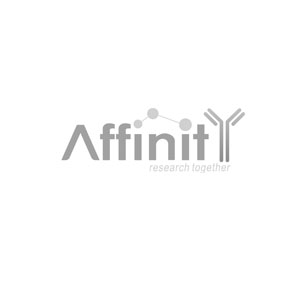CDCA3 Antibody - #DF3544
| Product: | CDCA3 Antibody |
| Catalog: | DF3544 |
| Description: | Rabbit polyclonal antibody to CDCA3 |
| Application: | WB IHC IF/ICC |
| Reactivity: | Human, Mouse, Rat |
| Prediction: | Bovine, Horse, Sheep, Rabbit, Dog |
| Mol.Wt.: | 28 KD; 29kD(Calculated). |
| Uniprot: | Q99618 |
| RRID: | AB_2835917 |
Related Downloads
Protocols
Product Info
*The optimal dilutions should be determined by the end user.
*Tips:
WB: For western blot detection of denatured protein samples. IHC: For immunohistochemical detection of paraffin sections (IHC-p) or frozen sections (IHC-f) of tissue samples. IF/ICC: For immunofluorescence detection of cell samples. ELISA(peptide): For ELISA detection of antigenic peptide.
Cite Format: Affinity Biosciences Cat# DF3544, RRID:AB_2835917.
Fold/Unfold
C8; CDCA 3; Cell division cycle associated 3; Cell division cycle associated protein 3; Gene rich cluster C8; Gene rich cluster protein C8; GRCC 8; GRCC8; MGC2577; TOME 1; TOME1; Trigger of mitotic entry 1; Trigger of mitotic entry protein 1;
Immunogens
- Q99618 CDCA3_HUMAN:
- Protein BLAST With
- NCBI/
- ExPASy/
- Uniprot
MGSAKSVPVTPARPPPHNKHLARVADPRSPSAGILRTPIQVESSPQPGLPAGEQLEGLKHAQDSDPRSPTLGIARTPMKTSSGDPPSPLVKQLSEVFETEDSKSNLPPEPVLPPEAPLSSELDLPLGTQLSVEEQMPPWNQTEFPSKQVFSKEEARQPTETPVASQSSDKPSRDPETPRSSGSMRNRWKPNSSKVLGRSPLTILQDDNSPGTLTLRQGKRPSPLSENVSELKEGAILGTGRLLKTGGRAWEQGQDHDKENQHFPLVES
Predictions
Score>80(red) has high confidence and is suggested to be used for WB detection. *The prediction model is mainly based on the alignment of immunogen sequences, the results are for reference only, not as the basis of quality assurance.
High(score>80) Medium(80>score>50) Low(score<50) No confidence
PTMs - Q99618 As Substrate
| Site | PTM Type | Enzyme | Source |
|---|---|---|---|
| T10 | Phosphorylation | Uniprot | |
| R28 | Methylation | Uniprot | |
| S29 | Phosphorylation | Uniprot | |
| S31 | Phosphorylation | Uniprot | |
| R36 | Methylation | Uniprot | |
| T37 | Phosphorylation | Uniprot | |
| S43 | Phosphorylation | Uniprot | |
| S44 | Phosphorylation | Uniprot | |
| K59 | Ubiquitination | Uniprot | |
| S64 | Phosphorylation | Uniprot | |
| S68 | Phosphorylation | Uniprot | |
| T70 | Phosphorylation | Uniprot | |
| T76 | Phosphorylation | Uniprot | |
| K79 | Methylation | Uniprot | |
| S82 | Phosphorylation | Uniprot | |
| S87 | Phosphorylation | Uniprot | |
| S94 | Phosphorylation | Uniprot | |
| T99 | Phosphorylation | Uniprot | |
| S102 | Phosphorylation | Uniprot | |
| T159 | Phosphorylation | Uniprot | |
| T161 | Phosphorylation | Uniprot | |
| S165 | Phosphorylation | Uniprot | |
| S167 | Phosphorylation | Uniprot | |
| K170 | Ubiquitination | Uniprot | |
| T177 | Phosphorylation | Uniprot | |
| S181 | Phosphorylation | Uniprot | |
| K189 | Ubiquitination | Uniprot | |
| S199 | Phosphorylation | Uniprot | |
| T202 | Phosphorylation | Uniprot | |
| S209 | Phosphorylation | Uniprot | |
| T212 | Phosphorylation | Uniprot | |
| T214 | Phosphorylation | Uniprot | |
| K219 | Ubiquitination | Uniprot | |
| S222 | Phosphorylation | Uniprot | |
| S229 | Phosphorylation | Uniprot | |
| K232 | Ubiquitination | Uniprot | |
| T239 | Phosphorylation | Uniprot | |
| S268 | Phosphorylation | Uniprot |
Research Backgrounds
F-box-like protein which is required for entry into mitosis. Acts by participating in E3 ligase complexes that mediate the ubiquitination and degradation of WEE1 kinase at G2/M phase (By similarity).
Ubiquitinated and degraded by the APC/C-Cdh1 complex.
Cytoplasm>Cytosol.
Interacts with SKP1. Part of a SCF (SKP1-cullin-F-box) protein ligase complex (By similarity).
The KEN box is required for the association with the APC/C-Cdh1 complex.
Restrictive clause
Affinity Biosciences tests all products strictly. Citations are provided as a resource for additional applications that have not been validated by Affinity Biosciences. Please choose the appropriate format for each application and consult Materials and Methods sections for additional details about the use of any product in these publications.
For Research Use Only.
Not for use in diagnostic or therapeutic procedures. Not for resale. Not for distribution without written consent. Affinity Biosciences will not be held responsible for patent infringement or other violations that may occur with the use of our products. Affinity Biosciences, Affinity Biosciences Logo and all other trademarks are the property of Affinity Biosciences LTD.
